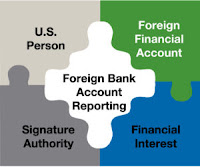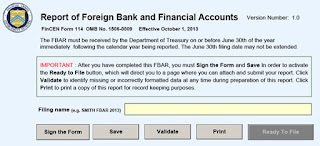On June 21, 2016 we posted US Taxpayers Are Receiving Automated $10,000 Penalty Assessments For Late Filed Form 5471's & 5472's - We Can Help! where we discussed that we have been receiving a lot of calls from businesses who have recently received penalty notices regarding late filed or non-filed Form 5471 & 5472's. The Internal Revenue Service imposes an automatic penalty of $10,000 whenever an individual or company is late in filing an information return disclosing their interest in a foreign corporation, regardless of whether there is any associated underreported of income or tax deficiencies.
Now in a recently updated International Practice Unit (IPU), IRS has explained the Code Sec. 6679 penalty for certain U.S. persons that are required to file Form 5471, Information Return of U.S. Persons with Respect to Certain Foreign Corporations, but fail to file, fail to file on time, or file an incomplete form. The IPU includes, among other things, insight as to what constitutes reasonable cause for failing to file.
U.S. persons including businesses with at least a 10 percent interest in a foreign corporation or who are officers of a foreign corporation in which any U.S. person owns or acquires a 10 percent interest are required to file a Form 5471 with their tax return to disclose their ownership.
The IRS has begun to automatically applying the $10,000 penalty for each Form 5471 and Forms 5472 that was filed after the due date.
There are ways to defend against these automatic assessments and request penalty abatement. There are four defenses that you should consider when assess the penalty for filing an international information return after the due date.
-
Follow the Delinquent Information Return Procedure - First, the taxpayer can file through the Service's procedures for delinquent international information returns. This procedure is appropriate for taxpayers who can establish reasonable cause for their failure to file or whose failure to file has caused no or nominal tax non-compliance. This procedure cannot be used, however, if the taxpayer is already under audit or investigation or has otherwise been contacted by the Service about the delinquent information returns. Under this procedure, the taxpayer files the delinquent returns with a statement of the facts establishing reasonable cause for the failure to file. In the "Frequently Asked Questions" section, the Service explains that taxpayers with tax noncompliance can use this procedure, but that the Service may impose penalties if it does not accept the taxpayer's reasonable cause explanation.
-
Ask for a First-Time Offender Abatement (FTA) - Generally, an FTA can provide penalty relief if the taxpayer has not previously been required to file a return or has no prior penalties (except the estimated tax penalty) for the preceding three years with respect to the same IRS File (IRM §20.1.1.3.6.1). With respect to a Form 5472 late-filing penalty, the IRM provides for an FTA if an FTA was applied to the taxpayer's related Form 1120 late-filing penalty or no penalty was assessed on the related Form 1120 (IRM §21.8.2.20.2).
-
Reasonable Cause Defense - Under Section 6038 of the tax code, which lays out the information reporting requirements for individuals and businesses with an interest in foreign corporations and the penalties for delinquent filing, penalties may be abated if a reasonable cause exists for the failure to file. However, neither the statute nor the applicable regulations define a reasonable cause standard for the abatement. Treasury Regulations Section 301.6651-1(c) provide a definition of what constitutes reasonable cause for failure to file corporate income tax returns and says that "if the taxpayer exercised ordinary business care and prudence and was nevertheless unable to file the return within the prescribed time, then the delay is due to reasonable cause." and
-
Statute of Limitations - Though a $10,000 penalty may discourage some from filing in international information return after the deadline, there is a greater exposure to not late filing and information return and that is that the statute of limitations for tax returns which is generally three years does not apply for returns that are missing the information reports and the statute remains open indefinitely. Under the indefinite statute of limitations, not only can the IRS make adjustments to items related to the international information returns, but they also can examine any other area on the tax return.
- . . . stock which meets the 10% stock ownership requirement (described below) with respect to the foreign corporation, or
- . . . an additional 10% or more (in value or voting power) of the outstanding stock of the foreign corporation.
A Category 3 filer is:
- . . . A USP who acquires stock in a foreign corporation which, when added to any stock owned on the date of acquisition, meets the 10% stock ownership requirement with respect to the foreign corporation,
- . . . A USP who acquires stock which, without regard to stock already owned on the date of acquisition, meets the 10% stock ownership requirement with respect to the foreign corporation,
- . . . A person who is treated as a U.S. shareholder under Code Sec. 953(c) with respect to the foreign corporation,
- . . . A person who becomes a USP while meeting the 10% stock ownership requirement with respect to the foreign corporation, or
- . . . A USP who disposes of sufficient stock in the foreign corporation to reduce his or her interest to less than the 10% stock ownership requirement. (Code Sec. 6046, Reg. § 1.6046-1(c))
Guidance for examiners. IRS examiners are instructed to determine whether a taxpayer who is required to file Form 5471 in fact filed a timely and accurate form. As noted above, the Form 5471 is due when the USP's income tax return is due, with extensions (and taking into account if the last day for filing was a weekend or legal holiday), and must be filed with that return. If one was not timely filed, or it wasn't complete, then penalties may be asserted unless the failure was due to reasonable cause.
While identifying Forms 5471 that were required, but not filed, for the exam year(s), examiners are instructed to consider reviewing whether similar failures occurred in earlier tax years. The IPU notes that the related income tax returns for the prior years are not required to be under exam to assess penalties under Code Sec. 6679.
There are ways to defend against these automatic assessments and request penalty abatement. These four defenses should be considered when your receive a $10,000 penalty for filing an international information return after the due date.
Automatic $10,000 Penalty for a Late Form 5471 or 5472?
Read more at: Tax Times blog


















